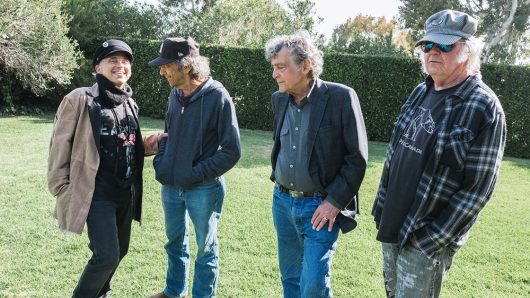It’s somehow apt that the musicians who first became The Sound, in 1979, originally called themselves The Outsiders, for that’s exactly how the band were regarded by rock’s mainstream – even while they were active during the 80s.
Hailing from South West London and fronted by charismatic vocalist/guitarist Adrian Borland, The Sound released five essential full-length studio albums, an equally compelling mini-album (1984’s Shock Of Daylight) and a coruscating live double album (1986’s In The Hothouse), yet despite amassing such an impressive catalogue – and cultivating a formidable following in Holland – they remained prophets without honour at home. Indeed, when the group split in 1987, the UK music industry barely shrugged its shoulders.
Listen to the best of The Sound here.
However, while bassist Graham Bailey wryly quips that The Sound have “become famous for not being famous”, this pioneering post-punk outfit have quietly been picking up plaudits over the past decade or so. The wider rediscovery of their music began in earnest in 2016, when Dutch filmmaker Marc Waltman released Walking In The Opposite Direction, a documentary that shed light on The Sound’s career and Adrian Borland’s subsequent solo activities prior to his tragic death by suicide, in April 1999.
More recently, The Sound again appeared on the public’s radar thanks to another innovative musical force, The Chemical Brothers. The acclaimed electronic duo imaginatively sampled Courts Or Wars (a track by Borland and Bailey’s side-project, Second Layer) for their track No Reason, a highlight from their most recent album, 2023’s For That Beautiful Feeling.
Buy The Sound’s first three albums on coloured vinyl.
Inevitably, this has once more piqued interest in The Sound’s music, with Warner Music now releasing limited-edition coloured-vinyl pressings of the band’s first three albums, Jeopardy, From The Lions Mouth and All Fall Down. Bassist Graham Bailey and drummer Mike Dudley speak to Dig! about the making of this seminal trio of records.
‘Jeopardy’: “The songs all still stand up to scrutiny”
The Sound’s sparkling debut album, Jeopardy, was well received by the music press, garnering a spate of five-star reviews and later provoking Dead Can Dance’s Brendan Perry to refer to it as an “existentialist post-punk jewel”. However, while Jeopardy first hit the racks in the autumn of 1980, its genesis is traceable back to 1979, when Adrian Borland’s initial punk outfit, The Outsiders, morphed into The Sound.
Originally also featuring bassist Bob Lawrence and drummer/lyricist Adrian Janes, The Outsiders issued two albums, 1977’s Calling On Youth (UK punk’s first self-released full-length album) and the following year’s Close Up, but after Bailey and Dudley replaced Lawrence and Janes, the group renamed themselves The Sound, adding Benita “Bi” Marshall on keyboards. Also taking the independent route, they released an EP, Physical World, through Tortch, an imprint set up by their close friend Steve Budd, a future manager of Heaven 17, Gang Of Four and many more, who would soon play an integral role in The Sound’s career.
“Adrian first met Steve at school, and they were part of the same circle of friends,” Bailey explains. “Steve funded the Physical World EP – and also Second Layer’s initial EPs [Flesh As Property and State Of Emergency] – as well as The Sound’s debut album, Jeopardy, though I supplied the tapes for the sessions, as I was working at the BBC at the time, so I could get master tapes for free.”




